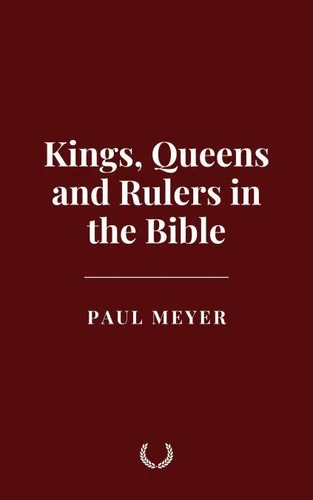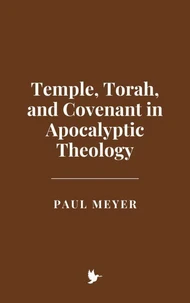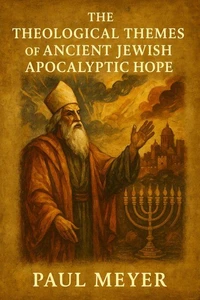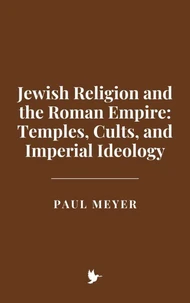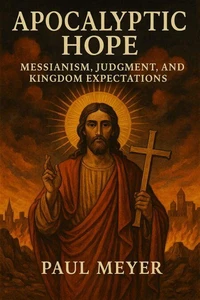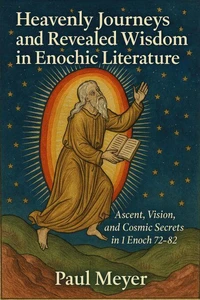Kings, Queens and Rulers in the Bible
Par :Formats :
Disponible dans votre compte client Decitre ou Furet du Nord dès validation de votre commande. Le format ePub est :
- Compatible avec une lecture sur My Vivlio (smartphone, tablette, ordinateur)
- Compatible avec une lecture sur liseuses Vivlio
- Pour les liseuses autres que Vivlio, vous devez utiliser le logiciel Adobe Digital Edition. Non compatible avec la lecture sur les liseuses Kindle, Remarkable et Sony
 , qui est-ce ?
, qui est-ce ?Notre partenaire de plateforme de lecture numérique où vous retrouverez l'ensemble de vos ebooks gratuitement
Pour en savoir plus sur nos ebooks, consultez notre aide en ligne ici
- FormatePub
- ISBN8230688006
- EAN9798230688006
- Date de parution10/01/2025
- Protection num.pas de protection
- Infos supplémentairesepub
- ÉditeurIndependently Published
Résumé
The book explores the complex and dynamic history of the Jewish people, focusing on key figures and events that shaped their identity, faith, and political structure throughout biblical history. It covers the reigns of various kings and rulers in Israel and Judah, examining their successes and failures, the theological implications of their actions, and the consequences for the people of Israel. Through detailed analysis of figures such as Saul, David, Solomon, Hezekiah, and Josiah, the book highlights the interplay between leadership, faith, and divine judgment.
The narrative includes key events such as the rise of the monarchy, the division of the kingdom, the exile to Babylon, the return to Jerusalem, and the Maccabean Revolt. The themes of God's sovereignty, covenantal faithfulness, and the tension between foreign domination and Jewish identity run throughout the text, exploring how these events shaped the Jewish people's spiritual and national consciousness.
The Maccabean Revolt, in particular, stands out as a significant chapter, as it marks a brief period of Jewish independence and the rededication of the temple in Jerusalem after it had been desecrated by the Seleucids. The Hasmonean dynasty, which emerged from the revolt, represented both the triumph of religious identity over Hellenistic influence and the challenges of reconciling political and religious leadership.
Ultimately, the book provides a deep exploration of the relationship between Israel's kings and their covenant with God, the consequences of disobedience, and the enduring hope for restoration. It reflects on the lessons of repentance, divine grace, and the complex intersection of faith and politics in the history of Israel and Judah. Through historical and theological analysis, the book offers a compelling narrative of God's engagement with His people throughout the trials and triumphs of their history.
The narrative includes key events such as the rise of the monarchy, the division of the kingdom, the exile to Babylon, the return to Jerusalem, and the Maccabean Revolt. The themes of God's sovereignty, covenantal faithfulness, and the tension between foreign domination and Jewish identity run throughout the text, exploring how these events shaped the Jewish people's spiritual and national consciousness.
The Maccabean Revolt, in particular, stands out as a significant chapter, as it marks a brief period of Jewish independence and the rededication of the temple in Jerusalem after it had been desecrated by the Seleucids. The Hasmonean dynasty, which emerged from the revolt, represented both the triumph of religious identity over Hellenistic influence and the challenges of reconciling political and religious leadership.
Ultimately, the book provides a deep exploration of the relationship between Israel's kings and their covenant with God, the consequences of disobedience, and the enduring hope for restoration. It reflects on the lessons of repentance, divine grace, and the complex intersection of faith and politics in the history of Israel and Judah. Through historical and theological analysis, the book offers a compelling narrative of God's engagement with His people throughout the trials and triumphs of their history.
The book explores the complex and dynamic history of the Jewish people, focusing on key figures and events that shaped their identity, faith, and political structure throughout biblical history. It covers the reigns of various kings and rulers in Israel and Judah, examining their successes and failures, the theological implications of their actions, and the consequences for the people of Israel. Through detailed analysis of figures such as Saul, David, Solomon, Hezekiah, and Josiah, the book highlights the interplay between leadership, faith, and divine judgment.
The narrative includes key events such as the rise of the monarchy, the division of the kingdom, the exile to Babylon, the return to Jerusalem, and the Maccabean Revolt. The themes of God's sovereignty, covenantal faithfulness, and the tension between foreign domination and Jewish identity run throughout the text, exploring how these events shaped the Jewish people's spiritual and national consciousness.
The Maccabean Revolt, in particular, stands out as a significant chapter, as it marks a brief period of Jewish independence and the rededication of the temple in Jerusalem after it had been desecrated by the Seleucids. The Hasmonean dynasty, which emerged from the revolt, represented both the triumph of religious identity over Hellenistic influence and the challenges of reconciling political and religious leadership.
Ultimately, the book provides a deep exploration of the relationship between Israel's kings and their covenant with God, the consequences of disobedience, and the enduring hope for restoration. It reflects on the lessons of repentance, divine grace, and the complex intersection of faith and politics in the history of Israel and Judah. Through historical and theological analysis, the book offers a compelling narrative of God's engagement with His people throughout the trials and triumphs of their history.
The narrative includes key events such as the rise of the monarchy, the division of the kingdom, the exile to Babylon, the return to Jerusalem, and the Maccabean Revolt. The themes of God's sovereignty, covenantal faithfulness, and the tension between foreign domination and Jewish identity run throughout the text, exploring how these events shaped the Jewish people's spiritual and national consciousness.
The Maccabean Revolt, in particular, stands out as a significant chapter, as it marks a brief period of Jewish independence and the rededication of the temple in Jerusalem after it had been desecrated by the Seleucids. The Hasmonean dynasty, which emerged from the revolt, represented both the triumph of religious identity over Hellenistic influence and the challenges of reconciling political and religious leadership.
Ultimately, the book provides a deep exploration of the relationship between Israel's kings and their covenant with God, the consequences of disobedience, and the enduring hope for restoration. It reflects on the lessons of repentance, divine grace, and the complex intersection of faith and politics in the history of Israel and Judah. Through historical and theological analysis, the book offers a compelling narrative of God's engagement with His people throughout the trials and triumphs of their history.

